- Home
- Jane Peart
Daring Bride Page 3
Daring Bride Read online
Page 3
Then Bryanne said seriously, “I’m happy working here in the studio. I’m developing a talent I wasn’t even sure I had. I’m finding myself. Do you understand?” She looked beseechingly at her brother. “Of course you do. I appreciate the way you’ve encouraged and supported me, Gareth. And Grandmother Blythe has, too. I don’t think Lynette supports me, not really. She’d like me to be more social. She’s always giving these little dinner parties and inviting eligible young men to meet me!” Bryanne threw out her hands in a helpless gesture, then laughed. “You see how it is, don’t you? The only way I’m going to be able to be myself is here, where I’m left alone and not bothered.”
Gareth looked at his younger sister affectionately for a moment, then said, “Well, at the risk of bothering you, I do have to remind you that we’re due at Montclair at seven and it’s after five now. So—”
“Yes, you’re right. I’d better go.” Bryanne got down off her stool. She went over to the stationary sink and wet and wrung out a cloth, then draped it over the model of the little child cuddling a small bunny. Then she wiped her clay-dried hands on her smock. “I’ll leave this now. Tomorrow it may look better to me. Tomorrow’s another day.”
From the library window, Jill Cameron saw Bryanne’s small red sports roadster round the drive and stop, watched as the slender, pretty young woman got out and walked toward the house.
How graceful she was, Jill marveled, thinking of the chunky, awkward child she had loved. From the very first time she had seen Bryanne, when Jill had gone with Garnet to the girls’ boarding school so she and Bryanne could meet, Jill’s heart had gone out to the motherless young girl so full of life, so eager to be loved. Once Jill had accepted Garnet’s offer to become Bryanne’s companion-governess, she and Bryanne had been inseparable. Jill couldn’t have loved her more if she had been her own. Even after Jill’s own two children were born, Bryanne claimed a special place in her heart.
She had wept with her over the neglect Bryanne’s artist father, Geoffrey Montrose, had shown her, and again when the news of Sean’s tragic, unnecessary death had come. She had worried about Bryanne’s months of heartbroken sorrow over the loss of her first love. Jill had been awed by the gradual development of her dormant creativity, the deepening of her spirituality. She had come to appreciate and care ever more deeply for this lovely young woman who had known tragedy and yet had made something beautiful of her life.
Jill was aware of the constant, if loving, pressure that Bryanne’s older sister, Lynette, was putting on Bryanne to bring her into a more active social life, and she dreaded Garnet’s insistence that Bryanne abandon her reclusive existence. Jill realized, as no one else seemed to, that in order for art to come into its fullest, it must have time. Times of aloneness, quietness, in order to achieve its potential, like a butterfly that must remain hidden in its chrysalis before emerging in all its beauty.
Jill had tried to explain this to her husband, Scott, since Bryanne had come to live with them at Cameron Hall. “She needs to be left alone. She is not dramatizing herself or being dangerously melancholy.”
In the months after Sean’s death, Jill had seen Bryanne heal herself. Bryanne had wandered through the gardens, spending hours in the gazebo, sometimes reading, sometimes dreaming. She had ridden her horse through the surrounding woods, letting the tranquillity of nature envelop her with its own magic powers.
Jill knew that Bryanne had passed through the valley and had begun to approach a new plateau when she decided to take some classes at the university. That’s when her interest in sculpting began. She came to the attention of her instructor, who encouraged her to submit one of her figures in a student exhibit. There it received an honorable mention. That was all Bryanne needed to openly pursue an urge to create that, before, she had been too shy to declare.
Jill knew, more than anyone else except perhaps Gareth, that Bryanne had lived under the shadow of her famous father for so long that she had not dared to show the slightest artistic ability, afraid that she would be compared or critiqued by him or his admirers.
With his usual self-absorption and indifference, Jeff Mor trose had not seemed to take note of the emerging artist in his daughter. He had moved to Taos, New Mexico, after Faith’s death, and at that point Bryanne had been able to forge ahead. Gareth offered her the use of Jeff’s old studio at Avalon, since Jeff rarely came back to Virginia. It was at the studio where Bryanne seemed to flower. Her new contentment and self-acceptance gave her a radiance that Jill rejoiced to see.
As for love or romance, something Lynette worried a great deal about for her sister, Jill was certain that when the time was right, that too would come. When she imagined this for Bryanne, Jill was reminded of a sleeping princess slowly awakening to her own indwelling nature, awaiting the kiss of a prince who would bring her fulfillment and completion.
No one should try to—or for that matter, could—bring this about until the time was right. The phrase “God is never too early, never too late; God’s timing is always perfect,” Jill prayed for Bryanne.
At the front door she greeted Bryanne. “Good day?”
“I think so. I hope so, or people will start telling me I’m wasting my time,” Bryanne replied with a little shrug.
“Don’t worry about other people. Follow your heart. You’re doing fine,” Jill said encouragingly. “I can’t wait to see your next piece.”
Bryanne gave her an impulsive hug. “Thanks, Jill. You’re great. And so is Gareth. My cheering squad.” Then she asked, “Where’s Grandmother?”
“Scott already took her over to Montclair. It seems she wanted to have a private talk with Cara before all the rest of us gathered.”
The two women exchanged a look, and then Bryanne laughed, saying, “Poor Aunt Cara. She’s probably in for it.”
“I wouldn’t worry. Cara can hold her own.”
Bryanne started toward the stairway. “Well, I’m off to take a long, leisurely bath and unwind a little before the party.”
“Wait, Brynie,” Jill said. “You got a letter today.” She picked up an envelope lying on the hall table and handed it to her.
A puzzled frown creased Bryanne’s forehead as she took it. Noting the New Mexico postmark, she lifted her eyes and met Jill’s. “It’s from father.”
Jill nodded. “I thought so.” Then, realizing Bryanne would want to read this rare communication in privacy, Jill started down the hall toward the back of the house, saying tactfully, “I have to go round up the children. We have to leave for Montclair soon. Do you want to ride with us or take your own car?”
“I think I’ll drive over on my own, thanks,” Bryanne said over her shoulder as she went up the stairs.
“All right. See you later at Montclair.”
As soon as she got to her own room, Bryanne tore open the envelope and read the single sheet written in Jeff Montrose’s spiky, almost illegible handwriting.
My Dear Daughter,
Just a short note to tell you I am planning to go to Scotland next summer to visit my late brother Jonathan’s widow. I’ve never met their children, Fraser and Fiona, and thought this as good a time as any to do so. Phoebe manages her family’s inn in a small town, Kilgaren. It is a part of the world I’ve not seen, and I shall probably stay there for several weeks, hoping to do some painting as well. If these plans work out and time allows, I intend to make a short stop in May field to see your sister and brother and you. I will let you know my traveling dates so the three of you can make appropriate arrangements for us to be together.
Ever your devoted father,
Jeff Montrose.
The signature was a flourishing scribble, familiar to collectors of his paintings.
Still holding the letter, Bryanne sat down on the edge of the bed. It was one of the few, hastily written communications she had had from her father over the years. He’d let so many years go by that she sometimes wondered if he even remembered she existed. Did he even know that his youngest daughter was artisticall
y talented?
Bryanne thought of the time the three of them had gone to Taos on impulse. It had been Gareth’s idea and Lynette had quickly agreed. Bryanne had just graduated from Miss Drummond’s Academy, and her father had been noticeably absent from the ceremony. In an uncharacteristic burst of resentment, Lynette had said to the other two, “he can’t just ignore us as he did when we were children. He can’t claim bereavement at this point. Mama’s been gone over twenty years.” A telegram had been dispatched, arrangements and train reservations made.
It had not been too satisfactory a time. Their father had been awkward around these three strange adults, having missed most of their childhood. But Bryanne had found Taos beautiful. In fact, she had fallen in love with it—the endless sky, the colors of the hills, the expanse of the desert, all so different from Virginia and the English countryside where she had grown up.
Her father’s house was a sprawling California-Spanish style with a tile roof, second-story veranda, terra-cotta tile floors, and a large, gracious courtyard with a fountain in the middle. Twisting paths lead down to a swimming pool in a natural setting of rocks and succulent plants and cacti.
His studio was separate from the house, having large windows with magnificent views. Bryanne had longed to ask him if she could stay and watch him paint. But he rose at dawn and secluded himself there until noon. He joined them for lunch on the patio, and the afternoons were spent driving around in his convertible, the evenings filled with the arrival of the circle of artist friends—writers, dramatists, actors—he had made in his winter stays there.
It had been a fascinating, heady time for Bryanne. Lynette had expressed disappointment that they had never had any time alone with Jeff. But Gareth had been philosophic, saying, “It’s too late for him to learn how to be a father now.” Bryanne, never having really known her father as a parent, was in awe of him as an artist, and she longed to have him talk about his work. She wanted to get to know him, learn from him.
They had left at the end of the week. Bryanne had felt sad that this opportunity had slipped away in social events and superficial conversation. She still didn’t feel she knew her famous father, and felt an emptiness in her heart that she was afraid would never go away.
And now this letter. It came at a time of decision in her own life. Again she felt pulled. Knowing how strong Garnet was, Bryanne had already begun to build strength to resist what she was suggesting. To go back to England with her grandmother was to become a child again. Garnet was a benevolent tyrant, Bryanne thought, smiling.
Scotland. She had a romantic image of the country. Rockbound coast, fields of heather, picturesque crofter’s cottages. Why couldn’t she accompany her father there, meet her Scottish aunt and her cousins? Perhaps such a trip would be her chance to really get close to a father she had missed, longed for, most of her life.
Bryanne folded the letter and replaced it in the envelope. It was something she would have to consider, think about, certainly pray about. But now she had to hurry, bathe, dress for the family birthday party at Montclair.
chapter
4
Montclair
IN THE MASTER bedroom, Cara stood in front of the full-length mirror, surveying herself. The dress was ages old and probably hopelessly out of fashion. She didn’t keep up with such things anymore. But its design was classic, the color good with her hair and her eyes. She wished she could ask Kitty about it___
As that thought flashed through her mind almost unconsciously, Cara was stricken anew with what had happened. Last night had been bad enough with the scene at the dinner table, followed by their awful quarrel. This morning was even worse. Kitty had moved out to Eden Cottage.
Kip had been livid about Kitty’s outspokenness in front of his guests. “Who does she think she is, anyhow?” he’d demanded when Beau and Tim left after dinner. “She hasn’t a clue about what’s really going on in aviation. Why does she have to bring the war into it? The rest of us have moved on. Kitty’s wallowing in the past.” He had flung himself down in the sagging leather chair in their bedroom and looked to Cara for some explanation.
“What can I say? Except that she’s still grieving over Richard.”
“It’s all that poetry stuff. Going to colleges and reading it, influencing all those young people with her pacifist notions.”
“Kip, it’s Kitty’s choice. It’s her life.”
“Well, it’s a poor way of living it, that’s all I have to say,” Kip had grumbled.
Cara regarded her reflection in the mirror of her dressing table and sighed. People used to call the sisters “mirror twins,” like two sides of the same coin. Kitty had always seemed so much more everything—smarter, sweeter, better. Being around her sometimes seemed to bring out Cara’s perverse traits, her dark side—selfish, self-willed, stubborn. And that made Kitty’s nature shine all the brighter.
Why can’t you be more like Kitty? That’s what their mother, Blythe, used to sometimes ask in despair at some of Cara’s wild, rebellious ways.
Welly I’m not like Kitty. Never have been, never will bel Cara put down her hairbrush and got up. Her reaction made her feel guilty. She felt cross and not ready to play the hostess tonight at the festive family party. She’d be glad when all the fuss of Aunt Garnet’s visit was over.
Just then she heard the sound of tires on the gravel driveway beneath her bedroom window. She went to look out and, to her dismay, saw Scott assisting Aunt Garnet out of his car. Too early! There were still a half dozen last-minute things to attend to. Why had Scott brought Aunt Garnet this soon? She would want to supervise everything. And she’d notice that Kitty wasn’t here. Then there’d be explanations to make and any number of other things to account for…. Well, there was no help for it. She’d have to go downstairs and see to everything.
As she hurried down the steps, the melodious chimes of the majestic grandfather clock rang out. This clock had stood in the front hall at Montclair as long as Cara could remember. Brought from Scotland by Clair Fraser, for whom Montclair was built but who had never lived here, it had an inscription carved in Gothic letters on the lower panel.
The clock of life is wound but once,
And no man has the power
To tell just where the hands will stop
At late or early hour.
To lose one’s wealth is sad indeed;
To lose one’s health is more
To lose one’s soul is such a loss
As no man can restore.
The present only is our own
Live, love, and toil with a will
Place no faith in “Tomorrow”
For the clock may then be still.
By the time it counted out the last stroke, Cara had reached the front door, put on a bright smile, and opened it. “Good evening! Happy birthday, Aunt Garnet. Welcome.”
While Scott went with Kip to view the new foal in the barn, Cara ushered Garnet into the small parlor. Without preamble Garnet said, “I’m glad to have this chance to speak to you alone, Cara, to tell you how shocked I was to see that sign at the gate. Yes, shocked is the word for it! Advertising riding lessons! My dear, don’t you have any idea how that looks? As if you and Kip were destitute. That’s a terrible image for the family. A Montrose taking paying students! Why, it’s outrageous, and you must stop it at once.”
Already upset from last night’s dinner table scene and her quarrel with her twin, Cara was hard put to check her indignation. However, in deference to her inbred respect for her elders, she tried to keep her voice even as she replied, “I need the money, Aunt Garnet, and I intend to keep on giving lessons.”
Garnet’s eyebrows rose in alarm. “Don’t you care what people say?”
“No, I don’t care what people say. I never have and I don’t intend to start now. And,” Cara added pointedly, “if family history is correct, neither have you, Aunt Garnet.”
Garnet regarded her niece with astonishment and pique. The arrow had hit the mark, however. She kn
ew exactly to what Cara was referring. Outwardly maintaining her dignity, Garnet said smoothly, “It is only for your own good, my dear, that I’m even bringing this up. You’ve put Kip’s pride on the line. If I know anything about the Montrose men, their pride is their most cherished possession. If they lose that, if that is undermined…Remember, I was married to one, and I certainly know what I’m talking about.”
“That was then, this is now, Aunt Garnet. Things have changed. Women—even southern women—don’t have to kowtow to their husbands anymore. We have our own pride, our own independence.” Cara smiled and, trying to soften her words with some humor, added, “Remember, we now have the vote!”
Garnet sniffed. “A rather hollow victory, I say, after what women in England went through to get it there—making public spectacles of themselves, being arrested and put in jail, being force-fed, and all the rest.” From the expression on her niece’s face, Garnet saw she wasn’t getting anywhere and switched tactics. “Besides, that’s not what I’m talking about. Mayfield is a small town. Reputations are gained and lost in a single round of gossip. If people think that Kip is hard up and that you are in financial difficulties, just think how it will affect Luc and even Nicole—later on, when you want Luc to succeed at whatever he plans to do, and if you want Niki to be asked to join the Legacy Ladies’ League.”
At this Cara could not help laughing. “Aunt Garnet, do you really believe that those snobbish women on the admittance board of the Legacy Ladies’ League would invite an adopted French orphan to become one of their elite members? If so, I think I know Mayfield society even better than you do.”
Garnet rose, adjusting her lace shawl, and said, “Well, Cara dear, I’ve said what I came to say. Naturally, you will have to do what you think is best for you and your family. But with your own mother so far away, I felt it was my duty to at least speak to you.”
Cara went over to Garnet and kissed her cheek. “Let’s not argue, Aunt Garnet. Kip and I are happy the way things are. Luc and Niki are growing up to be fine, responsible youngsters. I believe we’re instilling the important values in them. So please don’t worry about us, OK?” She gave her aunt a hug. “Come on, it’s your birthday. I want it to be a lovely party. Let’s go in the drawing room. I think I hear voices. Maybe some of the others have arrived.”

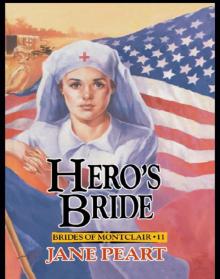 Hero's Bride
Hero's Bride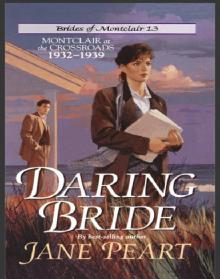 Daring Bride
Daring Bride Runaway Heart
Runaway Heart Promise of the Valley
Promise of the Valley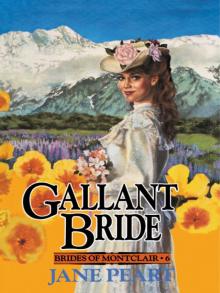 Gallant Bride
Gallant Bride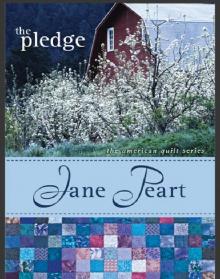 The Pledge, Value
The Pledge, Value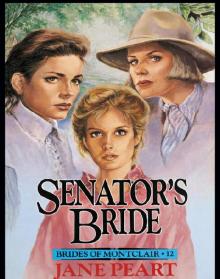 Senator's Bride
Senator's Bride Valiant Bride
Valiant Bride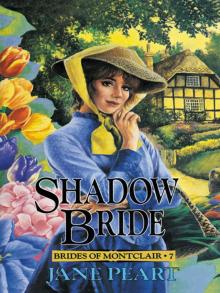 Shadow Bride
Shadow Bride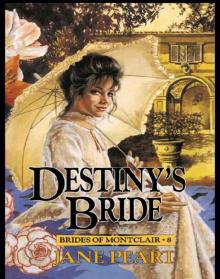 Destiny's Bride
Destiny's Bride A Tangled Web
A Tangled Web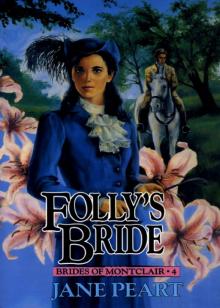 Folly's Bride
Folly's Bride The Promise
The Promise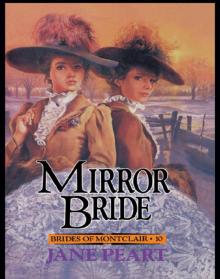 Mirror Bride
Mirror Bride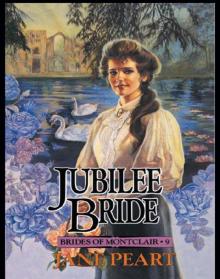 Jubilee Bride
Jubilee Bride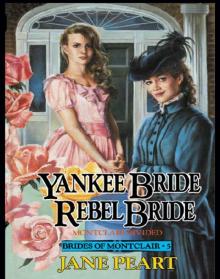 Yankee Bride / Rebel Bride
Yankee Bride / Rebel Bride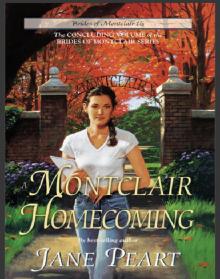 A Montclair Homecoming
A Montclair Homecoming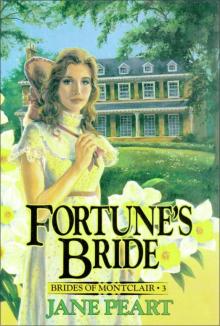 Fortune's Bride
Fortune's Bride Undaunted Spirit
Undaunted Spirit Love Takes Flight
Love Takes Flight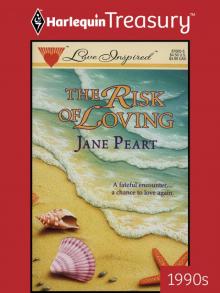 The Risk of Loving
The Risk of Loving The Pattern
The Pattern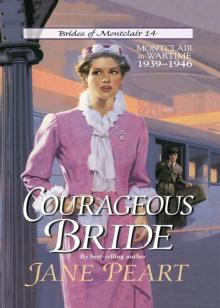 Courageous Bride
Courageous Bride